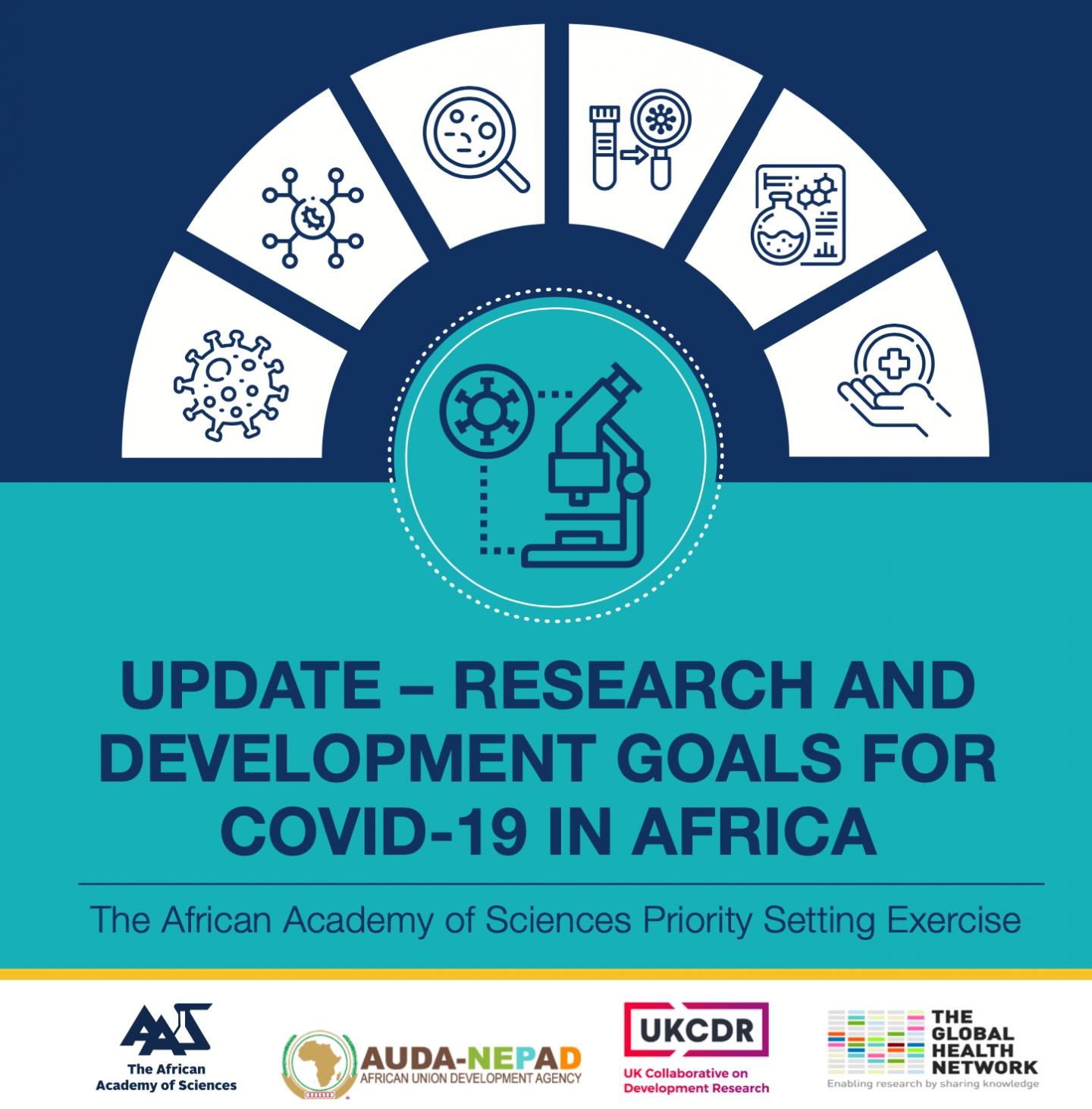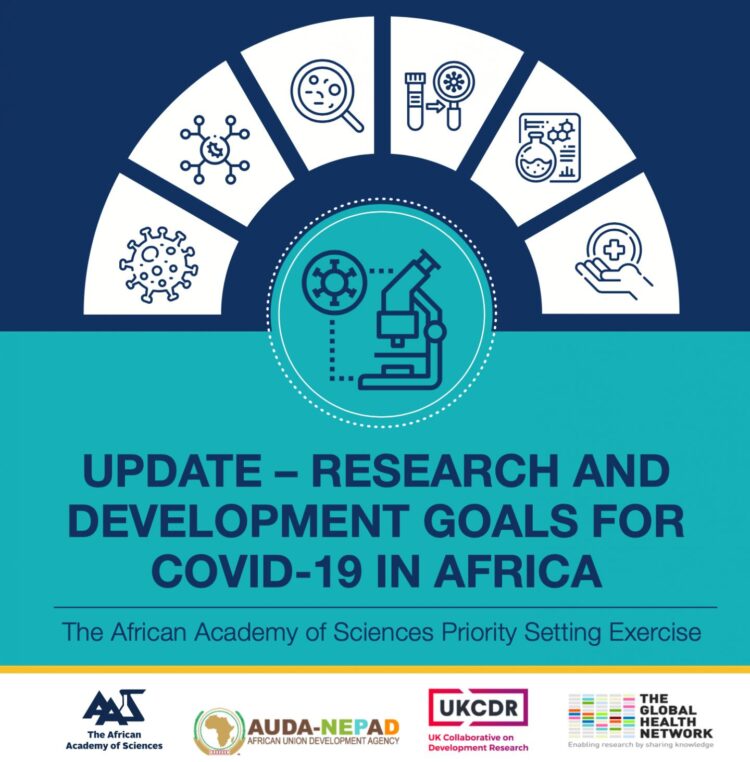
Credit: The African Academy of Sciences
Today a report was released that calls for the use of research evidence on the optimal implementation of public health interventions for COVID-19 in varied global settings.
In the absence of a vaccine and community-based treatment we are reliant on public health measures to stop this pandemic. From how to implement social distancing in urban informal settlements to how to gain trust and mitigate myths within communities. There is a clear and urgent need to further understand COVID-19.
The Global Health Network (TGHN), the African Academy of Sciences (AAS) and UK Collaborative on Development Research (UKCDR) have published findings of a global study to establish what are the remaining research priorities for COVID-19 and whether they are the same across the globe. A peer reviewed paper reporting these data has just been accepted for publication by BMJ Global, with a global perspective on this also being reported in Nature, today.
There is a finite window to undertake research within an outbreak. Scientists and researchers around the world have worked rapidly to increase understanding of COVID-19. But there are still many unknowns as the pandemic accelerates and spreads into new areas. Different studies are needed across the globe and the evidence must be tailored for different settings with the benefits from the research being equitable and widely accessible.
The World Health Organisation (WHO) produced a roadmap that set out the research priorities following a meeting in February, just before COVID-19 was declared a Pandemic. Now, at this point in the evolution of this novel disease across the world, it is important to assess whether these priorities are still current and whether they are the same for all types of communities and health care settings.
GHN, AAS and UKCDR undertook an online survey and held a series of workshops, where researchers representing all WHO regions were able to rank research questions, and identify new ones that need to be tackled within their health care setting and communities, mitigating this and future pandemics.
With contributions from over 3,000 healthcare workers and researchers, the results show that the global research community supports the existing WHO Roadmap, but strongly calls out areas where more focus is needed and where new priorities have emerged, particularly from low-resourced settings.
The results demonstrate there is a need for evidence on the relative effectiveness and optimal implementation of public health interventions in varied global settings. Study participants explained how they need data to show when and how best to implement social distancing, for example, in urban informal settlements where families are sharing limited sanitation facilities.
Another clear priority is to understand better how to gain community trust and mitigate myths, to understand the impact on already present diseases within communities and to explore the ethics of research during a pandemic.
Professor Trudie Lang, Director of The Global Health Network
“Less than 1% of the clinical trials registered across the globe are in low-income countries. This is a global pandemic and we need to ensure that we embed research everywhere COVID-19 is, so there is equitable benefit from the evidence, and that we tackled this together as a global research community. We also need to ensure the whole spectrum of research needed is able to access funding and attention so that all the remaining questions are answered. We have one opportunity to answer these for next time – and we still need urgent data to tackle this in every country”
Moses Alobo, Programme Manager of Grand Challenges Africa, African Academy of Sciences
“Our goal is to ensure that governments and other stakeholders have the necessary evidence to quickly identify and respond to areas in most need of attention, especially for Africa where resources are constrained.”
Marta Tufet, Executive Director, UKCDR
“Given COVID-19 is now being tackled in very different contexts across the world, understanding whether global research priorities are applicable at local level is key to ensure funding is directed to where the need is. We hope this more current perspective of what research gaps remain can be efficiently leveraged by global research funders to meet these priorities with greater coordination.”
###
Download the report here: https:/
Update: Research And Development Goals for COVID-19 In Africa: https:/
This Nature Article is Published yesterday at 1600: Plug COVID-19 Research gaps
https:/
The Remaining Unknowns: Available as a pre-print version
https:/
Note to Editors
The Global Health Network (GHN) is a global open community of practice for health workers, research teams and research organisations. It works to facilitate, support and enable research in disease, places and settings where evidence is lacking (http://www.
The African Academy of Sciences (AAS) is a non-aligned, non-political, not-for-profit pan African organisation whose vision is to see transformed lives on the African continent through science. Our tripartite mandate is recognising excellence through the AAS’ highly prestigious fellowship and award schemes, providing advisory and think tank functions for shaping Africa’s Science, Technology and Innovation (STI) strategies and policies and implementing key STI programmes addressing Africa’s developmental challenges through AESA. AESA (the Alliance for Accelerating Excellence in Science in Africa)’s mission is to catalyse investments, strategies and programmes that promote the brightest minds in Africa, foster scientific excellence, inspire research leadership and accelerate innovation in ways that will improve lives and shift the centre of gravity for African science to Africa. The Academy’s five strategic focus areas include: Environment and climate change; health and wellbeing; natural sciences; policy and governance; and social sciences and humanities. http://www.
The UK Collaborative for Development Research (UKCDR) is a collaborative of government and research funders working in international development. UKCDR exists to amplify the value and impact of research for global development by promoting coherence, collaboration and joint action. The core contributing members include BEIS, Department for International development (DfID), Department for Health & Social Care (DHSC), UKRI, and Wellcome.
Media Contact
Deborah-Fay Ndlovu
[email protected]
Original Source
http://www.





